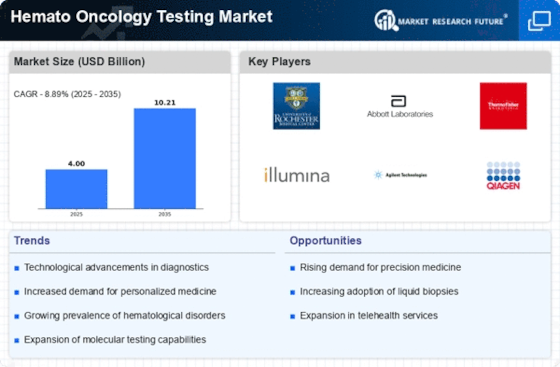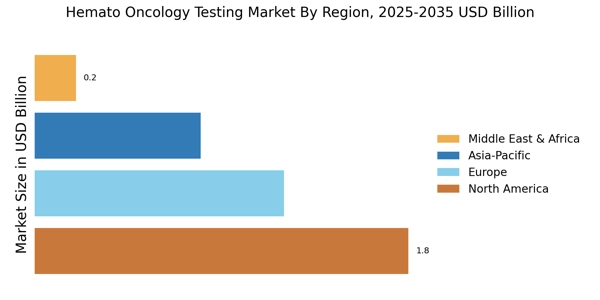Growing Investment in Cancer Research
The surge in funding for cancer research initiatives is a significant catalyst for the Hemato Oncology Testing Market. Governments and private organizations are increasingly allocating resources to advance research in hematological cancers, which in turn drives the demand for innovative testing solutions. Recent reports indicate that global funding for cancer research has reached unprecedented levels, with billions of dollars being invested annually. This influx of capital is likely to foster collaborations between research institutions and diagnostic companies, leading to the development of novel testing methodologies. As a result, the Hemato Oncology Testing Market stands to benefit from enhanced research capabilities and the introduction of cutting-edge diagnostic tools.
Advancements in Diagnostic Technologies
Technological innovations in diagnostic methodologies are significantly influencing the Hemato Oncology Testing Market. The advent of next-generation sequencing (NGS) and liquid biopsy techniques has revolutionized the way hematological cancers are diagnosed and monitored. These advanced technologies enable more precise detection of genetic mutations and alterations, which are critical for personalized treatment strategies. Market data indicates that the adoption of NGS in oncology testing is projected to grow at a compound annual growth rate of over 20% in the coming years. This rapid advancement in diagnostic capabilities is likely to enhance the accuracy and efficiency of hematological cancer testing, thereby driving the growth of the Hemato Oncology Testing Market.
Regulatory Support for Advanced Testing
Regulatory bodies are playing a crucial role in shaping the Hemato Oncology Testing Market by providing support for the development and approval of advanced testing technologies. Recent initiatives aimed at streamlining the regulatory process for innovative diagnostic tests have encouraged companies to invest in research and development. This supportive regulatory environment is likely to facilitate the introduction of new testing solutions that meet the evolving needs of healthcare providers and patients. As regulatory frameworks continue to adapt to the rapid advancements in technology, the Hemato Oncology Testing Market is expected to experience accelerated growth, driven by the introduction of novel and effective testing methodologies.
Increased Focus on Personalized Medicine
The shift towards personalized medicine is reshaping the landscape of the Hemato Oncology Testing Market. Tailoring treatment plans based on individual genetic profiles has become a focal point in oncology, particularly for hematological cancers. This approach not only improves therapeutic efficacy but also minimizes adverse effects. As a result, there is a growing demand for comprehensive genomic testing to identify specific biomarkers associated with various hematological malignancies. Market analysis suggests that the personalized medicine segment within the Hemato Oncology Testing Market is expected to witness substantial growth, driven by the increasing recognition of the importance of individualized treatment strategies.
Rising Incidence of Hematological Malignancies
The increasing prevalence of hematological malignancies, such as leukemia and lymphoma, is a primary driver for the Hemato Oncology Testing Market. According to recent statistics, the incidence of these cancers has been on the rise, with estimates suggesting that over 200,000 new cases are diagnosed annually. This surge necessitates advanced diagnostic testing to ensure timely and accurate treatment. As healthcare providers seek to improve patient outcomes, the demand for specialized testing services is expected to grow. Consequently, this trend is likely to propel the Hemato Oncology Testing Market forward, as stakeholders invest in innovative testing solutions to address the needs of an expanding patient population.

















